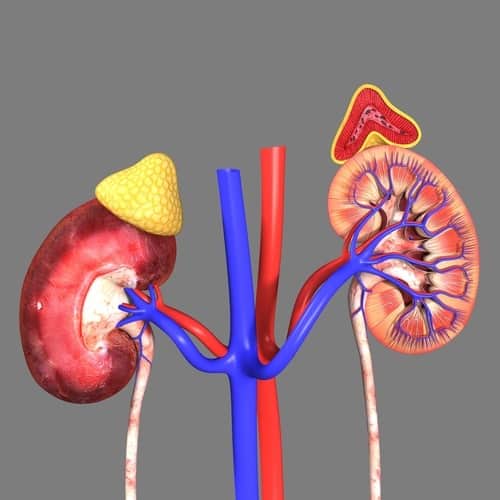The Hormone Roller Coaster
My first experience with fatigue issues was during perimenopause. And in the years since then I noticed how friends and colleagues also succumbed to adrenal fatigue during their perimenopausal years. It made me curious to find out about the connection between perimenopause and fatigue issues.
Many people attribute their unexplained tiredness to the nature of their jobs and probably a lack of sufficient sleep. During their 40’s women are most likely dealing with a busy career, teenage children, managing the household and increasingly busy and productive lives. The truth is, sometimes even after having enough sleep you may still feel tired and struggle to get through each day with so much on your plate.
It is concerning that after a visit to your doctor, you are told that nothing is wrong with you when actually you could be suffering from adrenal fatigue without even knowing it. Standard medicine does not recognize the existence of adrenal fatigue syndrome despite it reaching almost epidemic proportions due to our hectic modern lifestyles.
The main cause of fatigue as you head into menopause is caused by the changing hormone levels. Progesterone, oestrogen, adrenal and thyroid hormones all play a part in regulating cellular energy in the body. When hormones are imbalanced this can lead to fatigue.
Adrenal fatigue which many people think is simply tiredness, occurs when the adrenal glands function below their normal level. When this happens it leads to a feeling of weakness and a constant need to rest.
This type of fatigue may be as a result of a prolonged illness, such as a chronic infection like bronchitis or pneumonia. It can also occur after an extremely stressful sudden and traumatic experience, such as the death of a loved one. However, it is also commonly caused by the ongoing stress in our everyday lives.
The most common symptoms of adrenal fatigue which may vary from person to person include extreme fatigue, and general weakness of the body. Some of the other symptoms include:
- A general feeling of being “wired and tired”.
- Feeling fatigue during the middle of the afternoon.
- Difficulty coming fully awake in the morning.
- Cravings for salty and sugary foods.
- Waking regularly around 2 or 3 am every morning unable to fall back to sleep.
While it may be easier to recognize adrenal fatigue in those who have gone through a traumatic event or suffered from a chronic illness. There are others who feel all these symptoms without any prior chronic illness or traumatic experience. Often among this group of people are women approaching menopause or simply put, women experiencing perimenopause.
What Is Perimenopause?
Perimenopause is a stage in a woman’s life when she experiences a change in her usual pattern of menstruation due to hormonal changes. These hormonal changes cause abnormal menstruation in women over a period of time (which may vary from woman to woman) till the woman’s menstruation eventually ceases. The perimenopause stage comes to an end when a woman has not menstruated for about a year and is officially in menopause.
It is interesting to note that perimenopause is known to be the number one cause of unexplained adrenal fatigue in women. At the perimenopause stage of a woman’s life, there are hormonal fluctuations such as changes to their progesterone levels which can be responsible for their adrenal fatigue.
What Is Progesterone And Its Role In The Body?
The menstrual cycle is controlled by different hormones and progesterone is one of them. Progesterone is a hormone that is produced in the ovaries during the second phase of menstruation and it is released after the eggs have been transferred into the fallopian tubes.
In women of childbearing age, progesterone helps by releasing proteins which prepares the womb for pregnancy. Progesterone is also produced in the placenta when a woman becomes pregnant and this hormone helps in sustaining the fetus.

The progesterone and estrogen levels remain high during pregnancy to subdue ceaseless ovulation. Other functions of progesterone include helping to improve the growth of milk producing glands in the breast during pregnancy, regulating the functions of the adrenal gland and improving sexual desire. The proper functioning of progesterone is determined by the level of progesterone hormone in the body.
How Does Progesterone Affect Perimenopause?
The menstruation cycle which is usually between 28 to 35 days involves the discharge of the unfertilized egg and other tissue from the endometrium lining.
During the menstrual cycle, hormones which include progesterone help make the eggs in your ovaries mature and ready for fertilization. These hormones also make the lining of the womb thicker and ready to receive the fertilized eggs. For the eggs to be fertilized, they have a place to start growing, but if the eggs are not fertilized, the body sheds the thick lining.
During perimenopause, progesterone is the first hormone that goes into decline as the woman’s ovaries and eggs slowly lose their vigour. The ovaries which are the main producers of progesterone begin to produce little or none.
Women during perimenopause tend to have a low level of progesterone and, as women grow older the level of their progesterone drops drastically. This can cause the adrenal glands to function below optimal capacity or to function in an improper manner.
At this stage, women begin to exhibit some signs and symptoms, some of which include; headaches or migraines, mood changes, depression, hot flashes, low libido, general body weakness and so on. When menstruation finally ceases (that is when a woman reaches menopause), the adrenal glands are called upon to produce back up hormones.
What Are The Adrenal Glands?
They are small walnut sized organs situated on top of the kidneys. These endocrine organs contain the inner-medulla and outer-cortex that work together to release the adrenaline hormones also known as norepinephrine, DHEA and cortisol.

The function of adrenaline hormones cannot be overemphasized; apart from playing a crucial role in the body’s fight against chronic stress, they also increase the heart rate by causing blood to flow to the various organs and muscles in the body.
Progesterone And Cortisol
Cortisol is one of the hormones produced and released by the adrenal glands to help the body fight fatigue. It helps produce energy by metabolizing fats and proteins into sugars to create and maintain energy levels.
In other words, when the levels of progesterone drop, the adrenal glands start to produce the necessary hormones to replace it. However, to keep producing these hormones, the adrenal glands need to be in healthy ‘unstressed’ condition.
Once a woman reaches the age of 35 years, there is a dip in the release of estrogen and progesterone in the body. With these hormonal changes the woman’s menstrual cycle starts to become affected. As a woman reaches 40 years of age during the perimenopause stage, the progesterone hormone released in her body will decline quite markedly.
The older a woman gets, the older her ovaries will be too. Her egg production diminishes and the ovaries generate lower progesterone as well as estrogen. In addition, the woman’s pituitary gland will release pretty high levels of both LH and FSH which help her ovaries to go on functioning as usual.
They also help in the development of follicles, in the production of estrogen and then progesterone after the woman ovulates. Though the ovaries will perform to a level as before, sooner or later higher levels of LH and FSH will be needed to generate progesterone and estrogen, levels that just can’t be sustained for long.
As the woman nears menopause, the levels of estrogen in her body will further drop. At this point you can experience a series of symptoms that may include:
- Anxiety
- Mood swings
- Hot flashes
- Depression
- Adrenal fatigue
How Chronic Stress Leads To Adrenal Fatigue
In today’s world where women have to work extra hard to support the family, one cannot avoid stress both at home and at work. However, how much stress the body can endure depends on how the body of an individual is capable of reacting and effectively dealing with the stress factors.
When experiencing stress, the body tends to fight or combat the stress factors on its own accord through the release of sufficient levels of cortisol.
But, when the stress level rises to the point where it is severe or chronic and cortisol becomes exceedingly elevated in the body, it can be counterproductive. High levels of cortisol in the body can lead to excessive weight gain, blood sugar problems, high blood pressure, kidney failure and also the beginning of adrenal fatigue.
How The Adrenal Glands Produce Backup Hormones During Perimenopause
At the perimenopause stage, the adrenal glands make and release small amounts of estrogen and progesterone which help to ease the way through to menopause as mentioned earlier. If the adrenal glands fail to function properly, then the perimenopause journey becomes more difficult than normal as you feel the full effect of adrenal fatigue and it’s accompanying symptoms.
As our hormone systems are interconnected, you can see that imbalance anywhere has far reaching effects on the body. Worn out adrenals due to too much stress can exacerbate any perimenopausal symptoms as your poor adrenal glands are unable to produce the back up hormones needed for a smooth transition through to menopause.
13 Effects Of Adrenal Fatigue
As already mentioned, the effects and severity of adrenal fatigue can vary between each person. It really depends on how the individual’s is able to fight the stress factors causing adrenal fatigue. However, there are some general effects which may be more common than others and their level of intensity may also vary from person to person. These effects which can also be symptoms of ailments other than adrenal fatigue include;
- Fatigue – This is a general feeling of low energy. You feel physically and mentally exhausted all the time even after having a good night’s rest. As a result, you are unable to function properly both at work and at home.
- Hormone imbalance – Your hormone levels start to fluctuate irregularly.
- Weakened response – You will be unable to properly respond to stimuli or your response to stimuli would not be as fast as it should be.
- Brain fog – You have difficulty concentrating or focusing on tasks. At this point you also find it difficult to remember things, even events that are recent.
- Weight gain – Due to cravings for unhealthy foods such as foods high in sugar, salt and fatty foods.
- Moodiness and irritability – You will have unexplained mood swings which can place stress on your close relationships. You could also find people, places and objects to be irritating without any real explanation as to why.
- Decreased sex drive – Adrenal fatigue can lead to a drastic drop in your sex drive and this can be a devastating feeling for someone who was once sexually active.
- Depression – One other major effect of adrenal fatigue is depression. It can also lead to low self-esteem and self-worth.
- Skin ailments – With adrenal fatigue, you are likely to experience various skin ailments as a result of hormonal imbalance. Some of the skin ailments that you could experience include; breakouts, pimples, dull and scaly skin, skin discoloration and mild rashes.
- Lightheadedness – Adrenal fatigue also leads to lightheadedness, a faint feeling and frequent dizziness particularly when standing up from a sitting or lying position.
- Sleep disturbances – One of the first and easily noticeable effect of adrenal fatigue is unusual sleeping habits. You may have difficulty getting to sleep and awake at around 3am each morning.
- Muscle and bone weakness – It is also not uncommon for women suffering from adrenal fatigue to complain of muscle weakness, symptoms of arthritis and even osteoporosis.
- Hair loss – Falling and thinning hair is a common symptom of adrenal fatigue.
8 Natural Ways To Relieve And Combat Adrenal Fatigue
If you are experiencing any of the above listed effects of adrenal fatigue, there are cost effective and natural ways to boost the functions of your adrenal glands. Below are some measures that you can take to help you maintain healthy adrenal glands in order to fully combat adrenal fatigue.

- Get adequate rest – The first thing to do to gain relief from adrenal fatigue is to give your body the rest it needs by maintaining eight to ten hours of sleep daily. Whenever you feel tired after a hard day at work, make sure to listen to your body and get some rest. Do not overwork your body as it makes your adrenal glands work over-time.
- Manage stress – Perhaps the most important thing to help your adrenals is managing your stress. When stressed your adrenals are forced to work overtime pumping out hormones to deal with the situation. Using some stress relieving techniques each day helps rest your adrenals.
- Avoid negative thinking – There is genuine power in positive thinking as the body releases cortisol hormones for increased energy levels as a consequence of your positive thinking. Negative thoughts work in the opposite way and can cause your body to react adversely.
- Maintain a healthy diet – Keeping a healthy diet is a major factor in improving the health of your adrenal glands. Eat foods rich in fibre from vegetables, low sugar fruits, protein and healthy fats. The foods and drinks that may be detrimental to the health of your adrenal glands include; sugar, artificial sweeteners and preservatives, hydrogenated fats, processed and microwave foods. Also, avoid processed meat, and refined high carbohydrate foods. Quitting caffeine and limiting alcohol is also important for adrenal health.
- Take regular exercise – Avoid a sedentary lifestyle by engaging in and maintaining a regular, daily exercise regimen. Some exercise routines that don’t stress your adrenals include going for short to walks, dancing, swimming etc.
- Meditate regularly – Meditation can help you greatly as it has a way of calming as well as relaxing both your body and mind. If you are experiencing adrenal fatigue due to chronic stress, then engaging in meditation and yoga is a good way to relieve you of the symptoms of stress and in effect combat adrenal fatigue.
- Take warm baths – Warm baths can also help you to gain some much needed relief from adrenal fatigue. It helps improve blood circulation and relaxes the muscles of your body. Adding some Epsom salts and essential oils to the bath water adds to the effect of relaxation.
- Have a massage – Having a relaxing massage can equally help you to fight adrenal fatigue. If you are already experiencing the symptoms of adrenal fatigue, a massage will help to relieve you of stress. It will also help improve the quality of your sleep if you have sleeping difficulties as a result of chronic stress.
Putting It All Together
Being aware of the hormonal changes taking place during perimenopause is the first step in understanding how you can support and nurture your body through this transition. Perimenopause and fatigue don’t have to go hand in hand if you know how to avoid factors that can cause more pronounced hormonal imbalance.
Avoid stress, eat healthy food and take care of yourself a little more than usual and you’ll sail through perimenopause without the risk of developing adrenal fatigue syndrome.
Please Feel Free To Leave A Comment.





One of the best articles i’ve ever read on this topic. I’m menopausal now and wish I had read this earlier. Obviously I had adrenal fatigue thru that entire time and put it down to unexplained symptoms of Perimenopause. But I guess it’s good to understand even now that what was happening to me. Thank you for this….really appreciate it! Will try and be aware and do these things during Menopause now.
Very useful information.
Thank you a lot.
It happens so quickly with me that I scare I have tumor :).
Now ,I am calmer and trying to change my life to live in peace with perimenopause.
This is a great article, but is missing a key component in the area of treatment for this condition. If I had done only what you listed, I would still be an exhausted, grumpy, in pain mess of a woman. I worked with a functional medicine doctor to rebalance progesterone and identified some key elements I was low in and found the right source to replenish my body. Zinc, methylated Vitamin B12/folate, fish oil, black cohosh, tumeric and L-Tryptophan for depression along with a gluten-free, sugar-free, dairy-free diet took 30 pounds off and restored my energy. I’m one year into treatment and still have some hurdles, but I feel better, sleep better and am more myself than I’d been for 3 years. Western medicine can’t really help much with this, but functional medicine absolutely can. Thanks for writing this
Wonderful article. It clarifies a lot. I saw my ob gyn practitioner over the last year knowing that something was off with my hormones. I was 44 when I had no energy. I learned that I was depleted in testosterone even as a woman and my progesterone is low. I’m now on yam derived testosterone cream and it’s making a difference!! I am also taking yam derived progesterone capsules made in a compounding pharmacy my sleep has improved especially staying asleep. Thank goodness for a great obgyn and me advocating for myself.